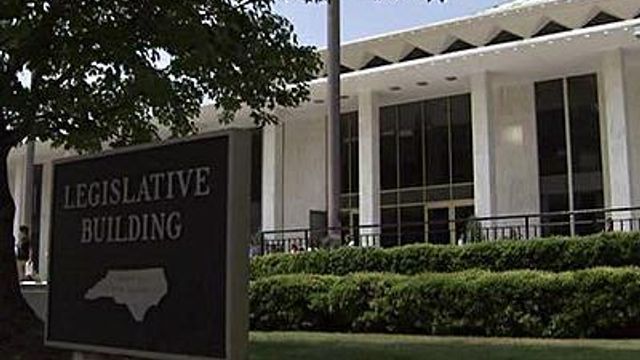Legislature works out details to session's end
The General Assembly worked into early Saturday to finalize economic incentives and criminal DNA testing bills as House and Senate leaders tried to shut down the session for the year.
Posted — UpdatedThe two chambers continued marathon floor sessions that began Friday morning and went well after midnight. They recessed for several hours in between while a handful of lawmakers sought compromises on competing bills while holed up in conference rooms or around tables in back hallways of the Legislative Building.
They returned to the House and Senate floors Friday night to vote on several of the bills, but others remained on the sidelines as the clock struck midnight.
The two sides appeared close to working out the final details on an ethics, campaign finance and government reform package, according to campaign reform and press advocates. The two sides had to find accord on how best to address concerns that campaign donations affect how elected officials appoint board and commission members or make contract decisions.
The package expected to be approved by lawmakers and sent to Gov. Beverly Perdue also will make it a felony to give $10,000 or more in illegal campaign contributions in a single election; expand information state agencies must make public about employees; and expand ethics law coverage and a lobbyist waiting period to cover more state employees.
"We have strong laws today but not strong enough," Senate leader Marc Basnight, D-Dare, told reporters Friday. "These just give clarity and create a transparency that should have occurred."
Democrats in both chambers reached compromises on a pair of economic incentives bills that among other items expands the size of tax breaks to the film industry, creates preferential tax treatment for green-friendly tenants in industrial parks and attempts to recruit a handful of unnamed companies by commerce officials who could bring 1,200 jobs to the state. The two chambers finalized the bills with separate votes early Saturday.
Basnight said the governor told him Friday the film breaks she sought to make North Carolina more competitive with other states weren't generous enough, but a Perdue spokeswoman said later the bill given near final approval Friday was a good start. Lawmakers agreed later Friday to sweeten the film package with a separate bill designed to improve the credits.
The two chambers reached a compromise on competing House and Senate legislation requiring police to take DNA samples from people when they are arrested on serious charges ranging from murder and rape to violent assaults and cyberstalking. State law now allows law enforcement to collect DNA only after someone has been convicted.
The Senate approved by a wide margin early Saturday the final DNA bill, which ultimately sets up a method that would require a person's sample be removed automatically from the state's DNA database when the suspect is acquitted or charges are dismissed. The House had yet to take up the bill.
On a party-line vote, the Democratic-led Senate gave its final approval Friday setting new rules corporations must follow to report political activities in light of a U.S. Supreme Court decision, and the House began taking up the bill Saturday. Senate Republicans tried unsuccessfully to remove nonprofit organizations from those rules.
But the House and Senate agreed late Friday afternoon in separate votes to create a new state regional commission formed in response to the controversy over dams owned by Alcoa Inc. along the Yadkin River.
Friday's delays were in sharp contrast to the rest of the eight-week session. For the first time since 2003, the Legislature passed and the governor signed a budget bill approved before the new fiscal year began in July. And the number of calendar days since the session began May 12 would be the fewest since 1996.
Lawmakers approved a nearly $19 billion budget June 30 that attempted to save public school teachers' jobs this fall and temper reductions in the University of North Carolina system. Republicans who voted in the minority against the budget argued it didn't prepare the state enough for a $3 billion shortfall next year and contained too few tax breaks for small business.
Lawmakers also gave final approval to reforms of the Alcoholic Beverage Control system and banned computer-based sweepstakes games showing up in parlors and Internet cafes statewide. Perdue will have until Aug. 9 to consider these and dozens of other bills awaiting her signature.
Barring a veto-override session or special session, the adjournment essentially will end the 42-year legislative career of Sen. R.C. Soles, D-Columbus, who is considered the state's longest continuously serving lawmaker. Soles decided not to run for re-election this year.
Copyright 2024 by The Associated Press. All rights reserved. This material may not be published, broadcast, rewritten or redistributed.






